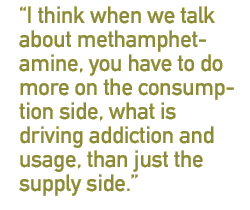An executive at Pfizer, the makers of Sudafed, Robins defends his industry's history of fighting to keep cold medicines easily accessible to consumers and to not require them to register at the store counter. He talks about the ways in which Pfizer has worked to address the meth problem, most recently in the development of phenylephrine, an alternative to pseudoephedrine that can't be converted into meth. This is an edited transcript of an interview conducted on Sep. 14, 2005.
What's the role that pseudoephedrine has played in consumers' lives over the years?
... Pseudoephedrine is a key ingredient in every sinus and allergy medication and virtually all cold medicines. As a result, about 140 million Americans a year use products today that [contain] pseudoephedrine to treat either an episodic cold or a more chronic condition like sinus or allergy suffering. ...
It's really very effective, and as a result, it allows people to get rid of the things that get between them and going on with their day when they have colds or allergies or sinus problems. That means they can go to work; they can take care of their families; they can pick up the kids -- all the things they need to get done. It's really a critically important product.
What are the problems in making something like pseudoephedrine a prescription drug?

I think whether it's prescription or behind the counter, eliminating access or making access to pseudoephedrine more difficult is going to result in a couple of things.
Taking pseudoephedrine back to being a prescription drug actually minimizes access for consumers, and a couple of [groups of] people get really hurt in that. First of all, the poorest members of society do, because they don't have health insurance. For them to get a product that's safe and effective, they actually now have to go and pay for a doctor.
The second thing is, it adds a step that frankly some people won't go through. As a result, they'll choose to stay at home from work more, [and] you'll have more sick days. So there's really a cost to society as well as a cost to the individual.
Do you think that consumers are paying an unfair price for the actions of a few bad apples, the meth traffickers and meth addicts?
I think pseudoephedrine has been caught in the middle of a really interesting conundrum. It's a great product, and it in itself is safe and effective and has been proven so for over 50 years OTC [over the counter]. However, the methamphetamine issue is a very serious issue. It's hard to say how many people should be hooked on meth prior to doing something to prevent the rest of society from going there. But clearly, a lot of people who are not abusing the drug are paying for the actions of those people who are using it for meth.
For the last 20 years, ephedrine and then pseudoephedrine haven't stayed accessible just by happenstance. The pharmaceutical industry has worked hard to counter efforts by the DEA [Drug Enforcement Adminstration] to regulate them. Of course, as a result of that access -- incidentally, as you would say -- there's been a lot of damage caused by meth. Meth cooks have had easy access to pseudoephedrine. How does Pfizer look at that issue?
... When we talk about the meth problem and pseudoephedrine, I think there is some confusion about what role over-the-counter products have played in this. My understanding from the DEA's own statistics is that 90 percent of the methamphetamine that's sold in this country and used in this country doesn't come from over-the-counter products. It comes from large labs that use bulk [ephedrine or pseudoephedrine] that they get illicitly and illegally. I think in framing the issue, we have to look at the pharmaceutical industry's role in this as really 10 percent of a very serious problem.
Having said that, over the past 10 years, we've done a number of things to actually try to diminish the issue without getting in the way of people legitimately purchasing pseudoephedrine for colds, coughs, allergies and sinus [relief]. For example, we've sponsored Meth Watch, which is an education program; we've helped treatment programs; and finally, we actually were part of the Methamphetamine Act of 1994, which was the first act to restrict the sale of pseudoephedrine. It put package limitations across the country.
What we haven't supported typically is a move all the way to reverse switching [to] pseudoephedrine; that is, to taking it behind the counter to where it's a pharmaceutical again. We've always been opposed to that, because we feel like that isn't fair balance in terms of access for the legitimate consumers versus those people who are using it for illicit means.
How do you feel about the whole issue of fighting to keep the bulk pseudoephedrine available when it was in fact going to the super labs?
Pfizer, for their part, always believed that reporting and registering -- which is what the DEA wanted over the past number of years -- was a legitimate way to go. I think you have to look at the industry and figure out exactly who was for this and against it. Frankly, a lot of the companies -- and I think there were 10 initially identified by [California] Senators [Dianne] Feinstein and then Barbara Boxer in the middle '90s -- were companies that weren't doing business with your brand-name pharmaceutical companies, like the Pfizers of the world.
[Is there a point of view of,] "We spent a lot of money developing this drug; we have a legitimate interest in pursuing it; it's not our fault that someone is [using it to make methamphetamine]"? How do you feel about all of this?
To be honest, we've wrestled with this. We've wrestled with this problem for about five to seven years at Pfizer specifically. We recognized that meth was a serious problem, but at the same time, we are absolutely committed to making sure that our over-the-counter products are available easily to the consumers who want to use them legitimately.
... Pfizer was so committed to keeping pseudoephedrine over the counter that we actually spent millions of dollars attempting to create a pseudoephedrine that could not be extracted from products and therefore converted into methamphetamine. The tough lesson that we learned is, as fast as we could do things, following all of the rules -- the FDA guidelines and things that make drugs appropriately safe -- well, the meth cooks could move a lot more quickly. So every time we would try to create an enhancement that would block them, they changed their process so they could extract it.
We finally had to abandon that and move to phenylephrine, and our goal with that is to have a product once again that consumers can buy safely and easily over the counter and then to have pseudoephedrine in those states where it's been moved behind the counter as places where you can go and talk to your pharmacist but still get the product.
How much does it cost to develop a new product?
Pfizer's approach to a technology answer for this is a little bit different than developing a new pharmaceutical drug, and everyone should know that. A new pharmaceutical drug costs hundreds of millions of dollars. In this case, what we tried to do was enhancements to an existing drug. We spent in the neighborhood of $15 million to $25 million, in terms of a real outlay of cash, as well as a number of years and scientists' time, trying to get to a pseudoephedrine that couldn't be broken and converted into meth.
But also, just in terms of whether it was developing pseudoephedrine in the first place or in terms of developing phenylephrine or a replacement, you're making a tremendous investment?
Pfizer's commitment to addressing the meth problem through technology solutions -- both Project Lock, where the pseudoephedrine couldn't be converted, and phenylephrine -- has cost us somewhere in the area of $25 million to $45 million to bring these products to market. These are products, bear in mind, where the drug itself is already approved. All we're trying to do is make sure that we can deliver good-quality products that can't be converted into methamphetamine.
If pseudoephedrine had been put behind the counter 15 years ago, Pfizer would have made a lot less money on it, but there might have been a lot less damage. How do you see that?
I don't believe that just moving pseudoephedrine behind the counter 15 years ago would have addressed the meth problem. And by the way, [for] the amateur cooker or creator of meth, my understanding is that, through organic chemistry, there are lots of things that can be converted into methamphetamine. What the cooks have done is move from one easy thing to the next easiest thing to the next easiest thing.
I think when we talk about methamphetamine, you have to do more on the consumption side, what is driving addiction and usage, than just the supply side. And so I think the answer that, "Hey, if we got rid of this particular ingredient, wouldn't meth no longer be a problem?" -- I don't agree with that argument.
There have been profits based on smurfers and meth cooks buying vast amounts of pseudoephedrine.
It's interesting, because there's been a lot made about how much profit was made by people who were buying this for illicit reasons. On the other side of that coin, we end up paying for the shrinkage; that is, the theft that these smurfers do by going into stores and stealing product. And I will tell you, I'm not sure that anyone's done the analysis, and in the end I'm not sure we made any additional money versus that product we had to actually replace because people had stolen it illegally.
Buying pseudoephedrine legitimately has not been the biggest issue, even within the 10 percent of over-the-counter use. Stealing pseudoephedrine of all kinds, whether it's Sudafed, Tylenol Cold or any other brands that carry this, has really been a critical issue for retailers, and they'll be happy to tell you that.
One activist who works on the meth issues and the consequences of meth told us, "I wonder how pharmaceutical industry executives like those at Pfizer can sleep at night." Do you think that's fair?
... I don't have any trouble sleeping at night given all that Pfizer's done to try to address the methamphetamine problem holistically. We support Meth Watch, which is an education program. We were the first out there with a technological solution, phenylephrine, that cannot be turned into methamphetamine. And we've been committed to both ensuring access for our consumers but also trying to deal with the actual meth consumption, which at the end of the day is the real cause of the problem here that's gone on.

COMMENTS
blog comments powered by DisqusIn order to foster a civil and literate discussion that respects all participants, FRONTLINE has the following guidelines for commentary. By submitting comments here, you are consenting to these rules:
Readers' comments that include profanity, obscenity, personal attacks, harassment, or are defamatory, sexist, racist, violate a third party's right to privacy, or are otherwise inappropriate, will be removed. Entries that are unsigned or are "signed" by someone other than the actual author will be removed. We reserve the right to not post comments that are more than 400 words. We will take steps to block users who repeatedly violate our commenting rules, terms of use, or privacy policies. You are fully responsible for your comments.